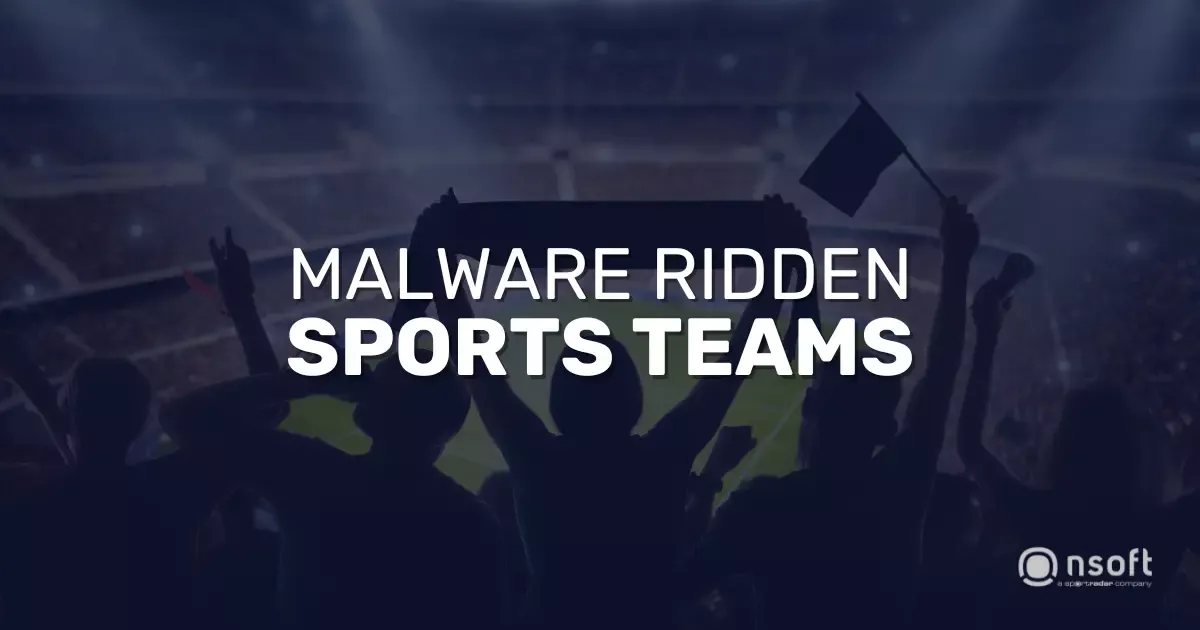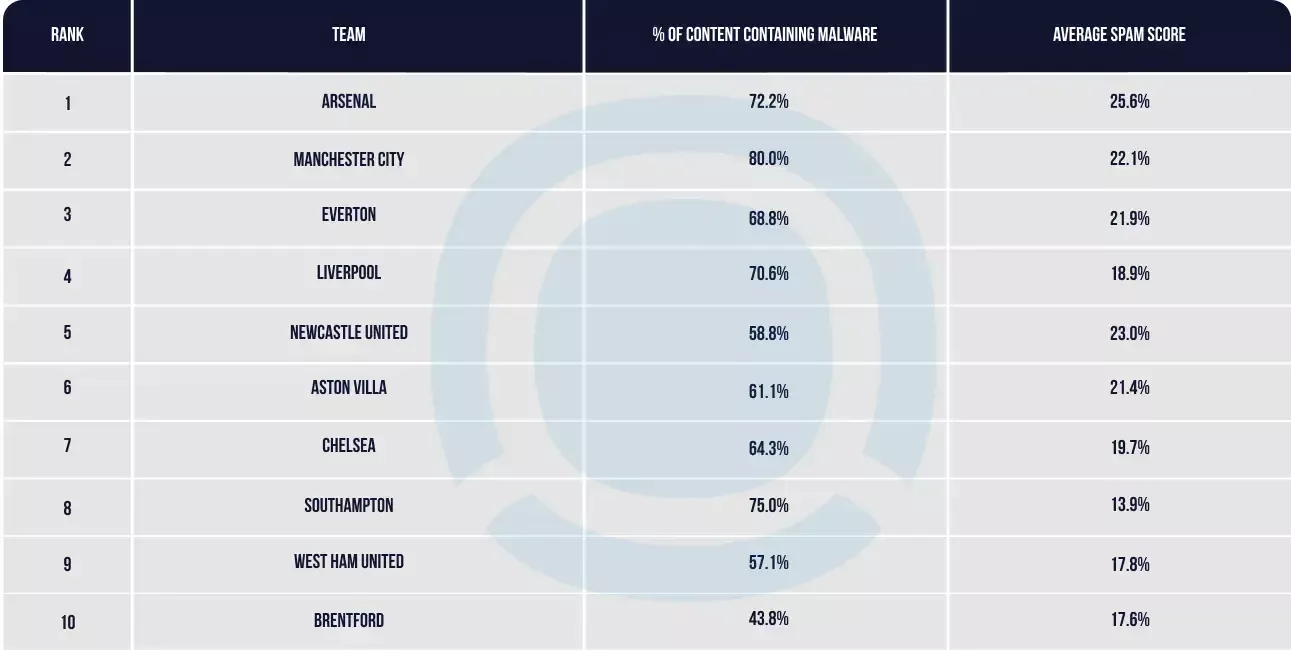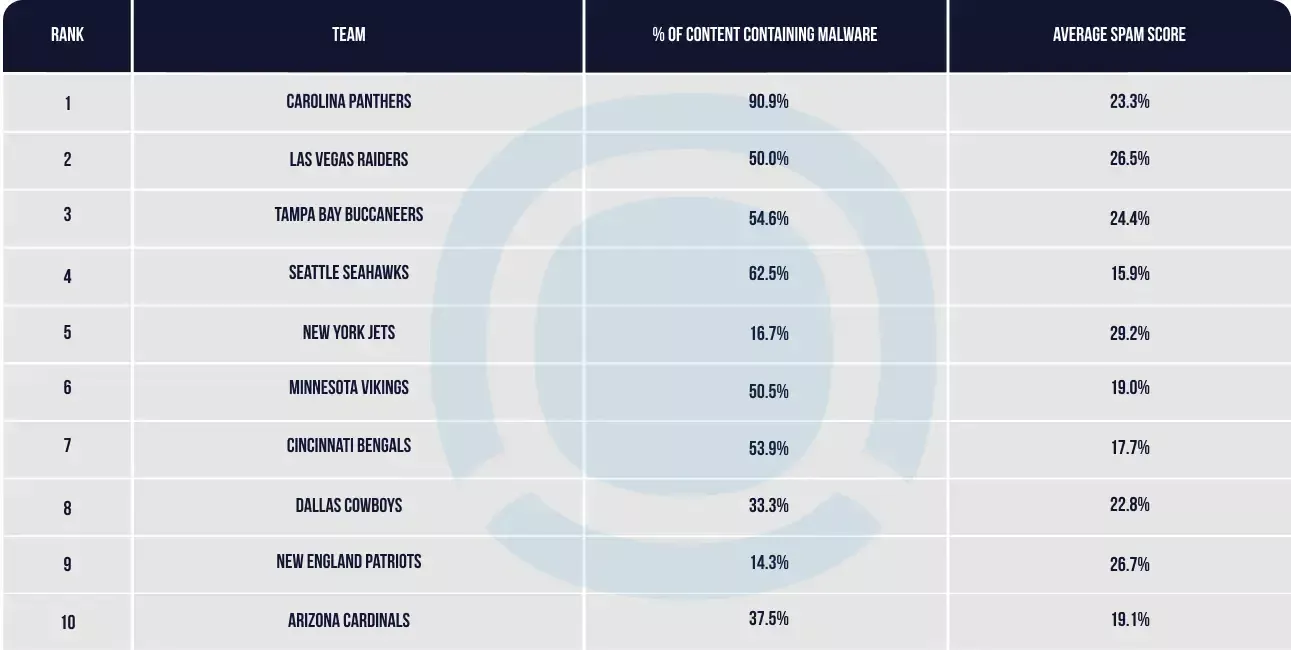Malware Ridden Sports Teams

- Reasons for the rise in illegal sports streaming
- The Premier League fan bases most at risk of encountering malware-ridden content online
- The NFL fanbases most at risk of encountering malware-ridden content online
- How can you protect yourself when browsing online?
- How can businesses protect their organization and employees from malware?
- Methodology
From 2020 to 2023, cyber-attacks surged by an alarming 72%, highlighting the urgent need for robust online security and heightened caution while browsing the web.
Sports fans, in particular, face heightened risks when trying to watch their favorite teams online. Many websites offering 'free' streaming options host unauthorized content, and users may unknowingly be participating in illegal activities by accessing these sites. In addition to the legal risks, these streams can also compromise your digital security. A survey by Dynata found that half of respondents who stream from unauthorized sites have experienced, or know someone who has experienced, scams, identity theft, fraud, or data loss as a result. But which teams' fans should be especially cautious due to dangerous websites streaming their games?
To find out, we investigated which sports team fans are at the greatest risk of consuming malware-ridden content online. We analyzed popular online forums and social media posts, none of which are officially affiliated with any clubs or teams, to determine which have the highest percentage of malware-ridden content, using a malware detection tool. The average spam score for each website was also analyzed to assess its overall safety.
Reasons for the rise in illegal sports streaming #
Illegal online streaming has seen a significant rise in recent years, largely driven by the increasing costs of sports streaming services. Many people simply can’t afford to pay for access to major games, while others turn to unauthorized streams because the matches aren’t available in their region. For UK football fans, illegal streaming also offers a way around the 3 pm Saturday blackout, which restricts live broadcasts in a bid to encourage ticket sales for local matches.
Despite increasing restrictions on social media and forums to curb the sharing of illegal streaming links, sports fans continue to find creative ways to bypass these barriers. Many use proxies or VPNs to access unauthorized streams, masking their real identities and reducing the risk of detection. Temporary link generators also play a role in evading moderation, as these links often expire before automated systems or moderators can flag them, making it harder to crack down on illegal activity.
While users have become skilled at accessing streams, the streaming sites themselves are equally crafty. They often create websites that appear legitimate, making it challenging for users to distinguish between legal and illegal content. However, these sites can be dangerous, potentially exposing users to harmful viruses and malware, and putting their data, financial information, and even their identities at risk.
The Premier League fan bases most at risk of encountering malware-ridden content online #
With 6,600 monthly searches for ‘Premier League live stream’ worldwide, and only 1,600 of those coming from the UK, watching football online is highly sought after, both in the UK and overseas. But which Premier League online fanbases run the highest risk of encountering malware?

Our research shows that Arsenal fans are at the highest risk of encountering malware, with a shocking 72.2% of online match streaming content showing evidence of malicious software. On top of that, over a quarter (25.6%) of these sites are flagged as spam, further increasing the threat to fans watching online games.
Manchester City games take second place, with a staggering 80% of online content for streaming matches linked to malware, the highest figure in our study. Although slightly less than Arsenal, 22.1% of this content is also marked as spam.
Everton fans aren’t far behind in risk, with 68.8% of the streaming content tested showing malware-related threats, and 21.9% flagged as spam.
Other teams like Liverpool and Newcastle United also show significant levels of malware risk, with more than half of their online content containing potentially dangerous malware.
Our findings demonstrate that fans engaging with these clubs' digital presence face higher risks of having their information stolen, making fans of these clubs particularly susceptible to digital threats.
The NFL fanbases most at risk of encountering malware-ridden content online #

The NFL receives an average of 40,500 searches for ‘NFL live stream’ a month, with the U.S. only accounting for just over half of them (22,200). It’s a sport that brings in fans from around the world, but which ones are more likely to encounter malware whilst online?
An analysis of NFL teams showed that the Carolina Panthers fans face the highest risk of online viruses, with 90.9% of the team’s online content potentially containing malware. A further 23.3% of the online streaming content for the Panthers was identified as spam, increasing the likelihood of phishing attempts.
Following in second are the Las Vegas Raiders, with half of the content from unofficial online forums containing potential malware and 26.5% flagging as spam content. Raiders fans looking to stream their games illegally not only risk infecting their devices but also expose themselves to a high volume of junk content.
Rounding off the top three is the Tampa Bay Buccaneers fanbase, with 54.6% of online streaming content showing malware and almost a quarter registering as spam (24.4%). The Seattle Seahawks take fourth place, followed by the New York Jets.
How can you protect yourself when browsing online? #
Spotting illegal sites and malware is crucial. With cybercriminals getting smarter, it's tough to tell which sites are legit. But with a bit of awareness, you can catch the signs and keep your browsing safe.
1. Use Comprehensive Security Software #
Get yourself a security suite that includes real-time protection against malware, a firewall, and tools to spot phishing attempts. Keep it updated regularly to fend off new threats; outdated software can miss new malicious code, leaving your system exposed. Set it to update automatically, so you're always protected.
2. Double-Check the URL #
Before sharing any sensitive info, look for "https://" at the start of the website address—the "s" means your data is encrypted and secure. If you only see "http://," proceed with caution. Pay close attention to the URL for odd spellings or strange characters, as scammers use these tricks to imitate real sites. For example, “paypal-secure.com” instead of “paypal.com” is a common phishing move.
3. Keep Your Software and Browser Up-to-Date #
Hackers look for vulnerabilities in outdated browsers and software. Regular updates on your operating system, browser, and apps plug these security gaps. Enable automatic updates so you always get crucial patches that keep malware out of older versions.
4. Avoid Pop-Ups and Suspicious Downloads #
Dubious sites often bombard you with pop-ups or unexpected download prompts, which legitimate sites rarely do. Never click on shady pop-ups, and only download files from trusted sources. Malware often hides in seemingly harmless files, like PDFs or Word docs, so a careful approach can save your system from potential threats.
5. Take Advantage of Browser Security Features and Extensions #
Activate security features built into your browser, like Google Chrome’s Safe Browsing or Firefox’s phishing and malware protections. Add-ons like HTTPS Everywhere, which secures connections, and uBlock Origin, which blocks ads and trackers, make browsing safer. Look for trust seals like Norton Secured or McAfee Secure to verify site legitimacy—always double-check these and read reviews to spot any red flags.
How can businesses protect their organization and employees from malware? #
It's common for employees to use their work laptops for a variety of personal reasons, including streaming games. However, it's important for businesses to put in place ways to stop these online threats on their company's devices, as they can open themselves up to stolen data and even financial losses. Here are some simple steps businesses can take to protect themselves from malware:
1. Train Employees on Safe Browsing and Downloading #
Train your team on how to spot phishing attempts, avoid risky links, and only download software from trusted sources. These skills help prevent costly mistakes. For example, show employees what phishing emails look like and how to recognize suspicious links, so they avoid accidental malware downloads or unauthorized access to sensitive data.
2. Set Clear Cybersecurity Policies #
Create guidelines on the acceptable use of company devices, including rules about personal streaming and downloading. Make sure employees understand the risks of their online actions. For instance, explain how personal use of work devices can introduce malware and lead to data breaches, and hold regular training sessions to keep these policies top of mind.
3. Install Endpoint Security and Use Network Segmentation #
Protect every device with strong endpoint security, including antivirus, anti-malware, and firewall software, to block threats. Network segmentation—separating sensitive data from general network traffic—helps contain malware if an employee’s device gets infected.
4. Use Data Loss Prevention (DLP) and Application Whitelisting #
DLP tools keep sensitive data from leaving the network through unauthorized transfers like email, USB, or web uploads. For example, set up DLP to automatically block unapproved data transfers. Application whitelisting, which only allows approved apps to run, adds another layer of security by preventing accidental malware installations.
5. Apply Role-Based Access Control (RBAC) and Run Regular Audits #
RBAC restricts access to sensitive data based on roles, so only people who need it can view critical information, minimizing risk. Regular audits and penetration testing also expose vulnerabilities before attackers can exploit them. For instance, penetration tests help uncover entry points for malware, allowing you to strengthen defenses proactively.
Methodology #
This methodology determined which Premier League and NFL fanbases are most at risk of encountering malware when accessing streaming content. Here's a breakdown of how this study was conducted:
1. Data Collection
The research began by identifying platforms where fans of each Premier League and NFL team engage online. These platforms included Subreddits (fan pages on Reddit), online supporter forums, and Twitter fan pages.
From these sources, the team compiled lists of websites that fans from each team frequently recommended for streaming live games online.
2. Malware Risk Assessment
Once the lists of recommended streaming websites were collected, the research team used a malware detection tool called SUCURI to evaluate the potential risk of each website.
SUCURI scans the websites and identifies whether they pose a threat by hosting malware or other malicious content.
Each team was then given a score based on the percentage of websites recommended by its fanbase that were flagged as medium or higher risk. This score represents how vulnerable the fanbase is to malware threats based on the streaming sites they commonly use.
3. Spam Content Assessment
In addition to checking for malware, the team also assessed each website for spam. This means looking for websites flagged for hosting spammy content (irrelevant or inappropriate messages, ads, or unsolicited content).
A "spam score" was calculated for each team, representing the proportion of streaming websites associated with spam content.
Disclaimer: The online forums, Subreddits, and Twitter fan pages analyzed in this research were unofficial. They had no direct affiliation with the clubs or teams.
Tags:
Related Articles
News
29.04.2025.
NSoft and InnovaPlay Strategic Partnership
The strategic collaboration integrates NSoft’s innovative sportsbook technology seamlessly into InnovaPlay’s comprehensive white-label and full web solution, empowering sportsbook operators to reach new heights of performance and player engagement.
Learn more
News / Interviews & Editorials
16.04.2025.
Beyond the Bet: How Gamification is Reshaping Online Gambling
By making the gamification elements fun, relevant, and optional, you ensure that they enhance the betting experience rather than overshadow it.
By Marko Galić, Game Mathematician & Project Manager at NSoft
Learn more
News / Interviews & Editorials
08.04.2025.
The Formula One Race Report
Attending a Formula One Grand Prix is a bucket-list experience for many motorsport fans but while the roar of the engines and the glamour of race days are undeniably exciting, the cost of attending is a luxury few can regularly afford.
We break down the true cost of attending a race weekend this season, ranking Grand Prix events. So which one offers the best value for money?
Learn more
Didn’t Find What You’re Looking For?
Our team will be happy to guide you through our products and services.
Contact us